Devyser enters Strategic Supply Agreement with Illumina to offer sequencing instruments and products
Devyser today announced that it entered a strategic agreement with Illumina, a global leader in DNA...
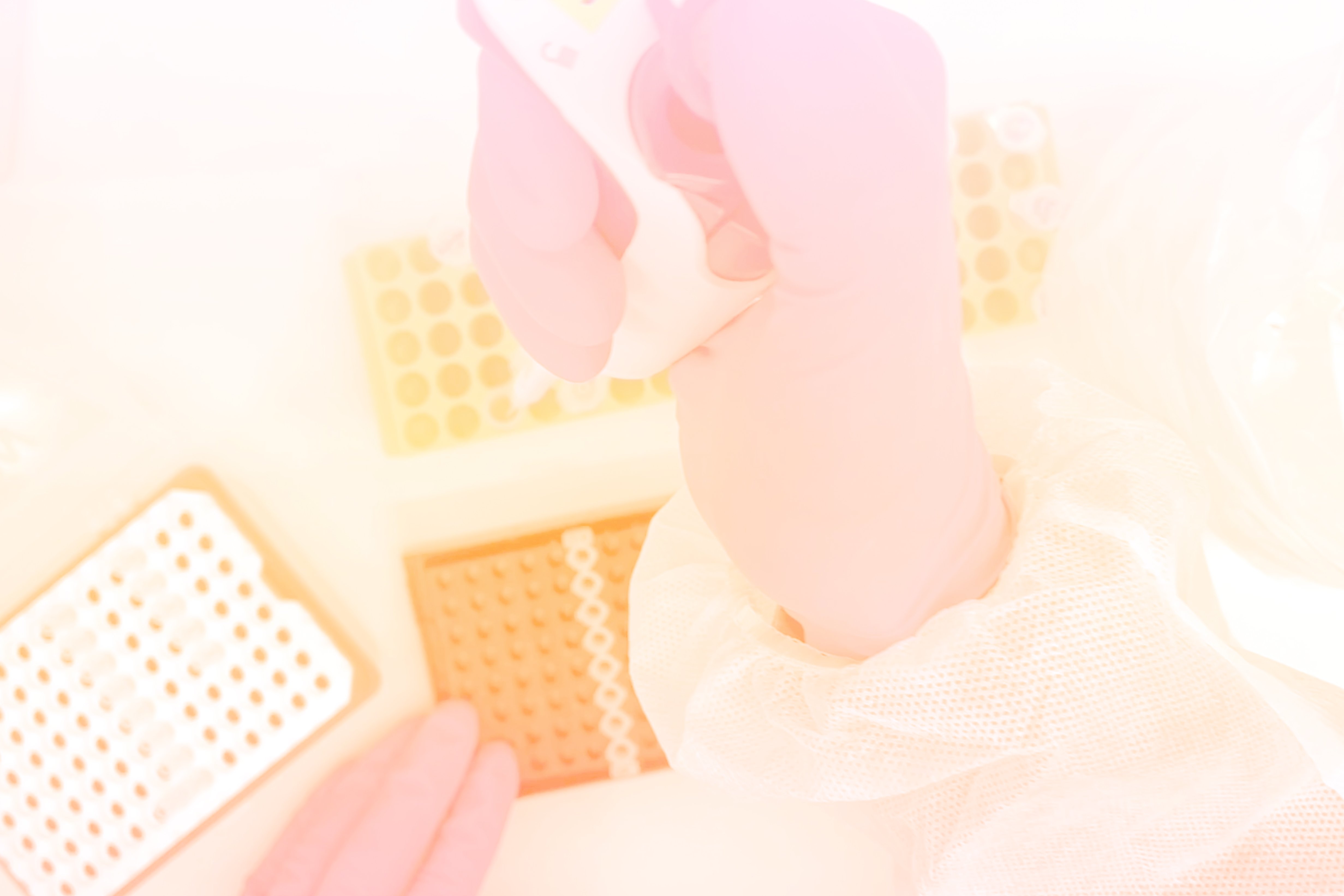
Post-transplantation | March 9, 2023
With new more sensitive diagnostics, rejection of a transplanted kidney can be detected earlier, and proper treatment introduced to protect the kidney. Studies show that the level of concentration of donor DNA fragments donor derived cell free DNA (dd-cfDNA) in blood in the patient may act as an early marker for rejection, following damage to the transplanted kidney. The goal of new more sensitive diagnostics is to increase the survival of the new organ and reduce the need for new transplantation.
Kidney transplantation is the best treatment for patients with severe chronic kidney disease (CKD). Compared to dialysis, kidney transplantation provides higher patient survival and superior quality of life(1). A major problem associated with kidney transplantation is the risk of damage or kidney loss. The most common causes for this are rejection, surgical complications, or other kidney damage by for instance by immunosuppressive drugs(2). The current method to detect rejection after transplantation is to measure the creatinine concentrations in the blood together with the assessment of tissue biopsies from the kidney. But as the creatinine concentration in the blood increases, damage already have occurred, and the treatment options are fewer.
Crossmatching to avoid rejection
Several methods have been developed to determine the immunological activity of the recipient before a transplant. These are, for example, crossmatching between donor and recipient as well as analysis of antibodies in the patient against tissue surface antigens. Crossmatch is a good example of practical application of precision medicine. Despite many efforts to match patient and kidney before transplantation, to minimize the risk of immunological problems, rejection still may occur.
Goal to improving kidney survival
Rejection takes place when the recipient's immune system attacks the transplanted kidney. This is most common during the first few weeks but can also occur at any time after transplantation. The rejection is caused by lymphocytes in the recipient's immune system. To avoid permanent damage to the kidney, it is important to quickly diagnose if rejection and what type is occurring, to be able to introduce the best treatment. The goal is to improve the kidney survival and avoid the need for a new transplant or dialysis. Unfortunately, doctors still lack sufficiently sensitive methods for the early detection of kidney injury after transplantation.
Sensitive test measures the concentration of DNA
Several studies have shown that donor-derived cell-free DNA, (dd-cfDNA) can be detected and measured in urine and blood in the recipient of kidney transplants and appear to be signs of damage to the kidney(3,4,5). Studies have also shown that the concentrations of DNA increased significantly in connection with acute rejection, often before clinical diagnosis, and returned to normal level after treatment for rejection. (6)
In a study, conducted in collaboration with Devyser, renal transplant patients have been closely followed and an ultra-sensitive test has been used to measure the concentration of dd-cfDNA in blood. The study showed that the increase of dd-cfDNA in the blood took place before the increase in creatinine, caused by acute rejection, by as much as 5-7 days. The conclusion is that new more sensitive diagnostics are an effective tool for early detection of rejection as well as other damage to the kidney. Through frequent measurement of dd-cfDNA after transplantation, rejection can be detected long before the creatinine content in the blood increases (7). The results were presented at the Scientific Conference American Society of Histocompatibility and Immunogenetics, ASHI, in the US earlier this fall.
For more information, please contact,
Fredrik Alpsten, CEO
Mail: fredrik.alpsten@devyser.com
Telephone: +46 70 667 31 06
Theis Kipling, CCO
Mail: theis.kipling@devyser.com
Telephone: +46 703 598 07 76
References
1. Vathsala, A. (2005) "Preventing renal failure.” Annals of the Academy of Medicine, Singapore 34(1): 36-43.
2. Vathsala, A. (2005) "Preventing renal failure." Annals of the Academy of Medicine, Singapore 34(1): 36-43.
3. Bloom RD, Bromberg JS, Poggio ED, et al. Cell-free DNA and active rejection in kidney allografts. J Am Soc Nephrol. 2017; 28:2221–2232.
4. Sigdel TK, Vitalone MJ, Tran TQ, et al. A rapid non-invasive assay for the detection of renal transplant injury. Transplantation. 2013;96: 97–101.
5. Bromberg JS, Brennan DC, Poggio E, et al. biological variation of donor-derived cell-free DNA in renal transplant recipients: clinical implications. J Appl Lab Med. 2017; 2:309–321.
6. Garcia Moreira, V., B. Prieto Garcia, J.M. Baltar Martin, F. Ortega Suarez, and F.V.Alvarez (2009). “Cell-free DNA as a non-invasive acute rejection marker in renal transplantation.” Clinical Chemistry 55 (11): 1958 -1966.
7. Pettersson Linnea, Carlén Sofia, Vezzi Francesco, Haughey Caitlin, Hedrum Anders, Hauzenberger Dan. Detection and monitoring of dd-cfDNA in patients following kidney transplantation. Devyser AB. Poster presentation, ASHI, Oct 2022.
About Devyser
Devyser develops, produces, and sells genetic testing kits and services to laboratories in more than 50 countries. The products are used for advanced DNA testing in the hereditary disease, oncology, and transplant fields, to enable targeted cancer treatment, the diagnosis of a broad range of genetic diseases, and transplant patient follow-up. Devyser’s products and unique, patented easy-to-use single-tube test simplify genetic testing processes, minimize hands-on time, and deliver rapid, accurate, and trusted results. Our aim is to ensure every patient gets a correct diagnosis in the shortest possible time.
Devyser was founded in 2004 and is based in Stockholm, Sweden. We have 8 own sales offices in Europe and the US where we also have our own service lab in Atlanta, Georgia. In August 2022 we received certification for our quality management system and Devyser Compact under the new comprehensive European IVD Regulation.
Devyser’s shares are listed on Nasdaq First North Growth Market (ticker: DVYSR). The company’s Certified Adviser is Redeye AB.
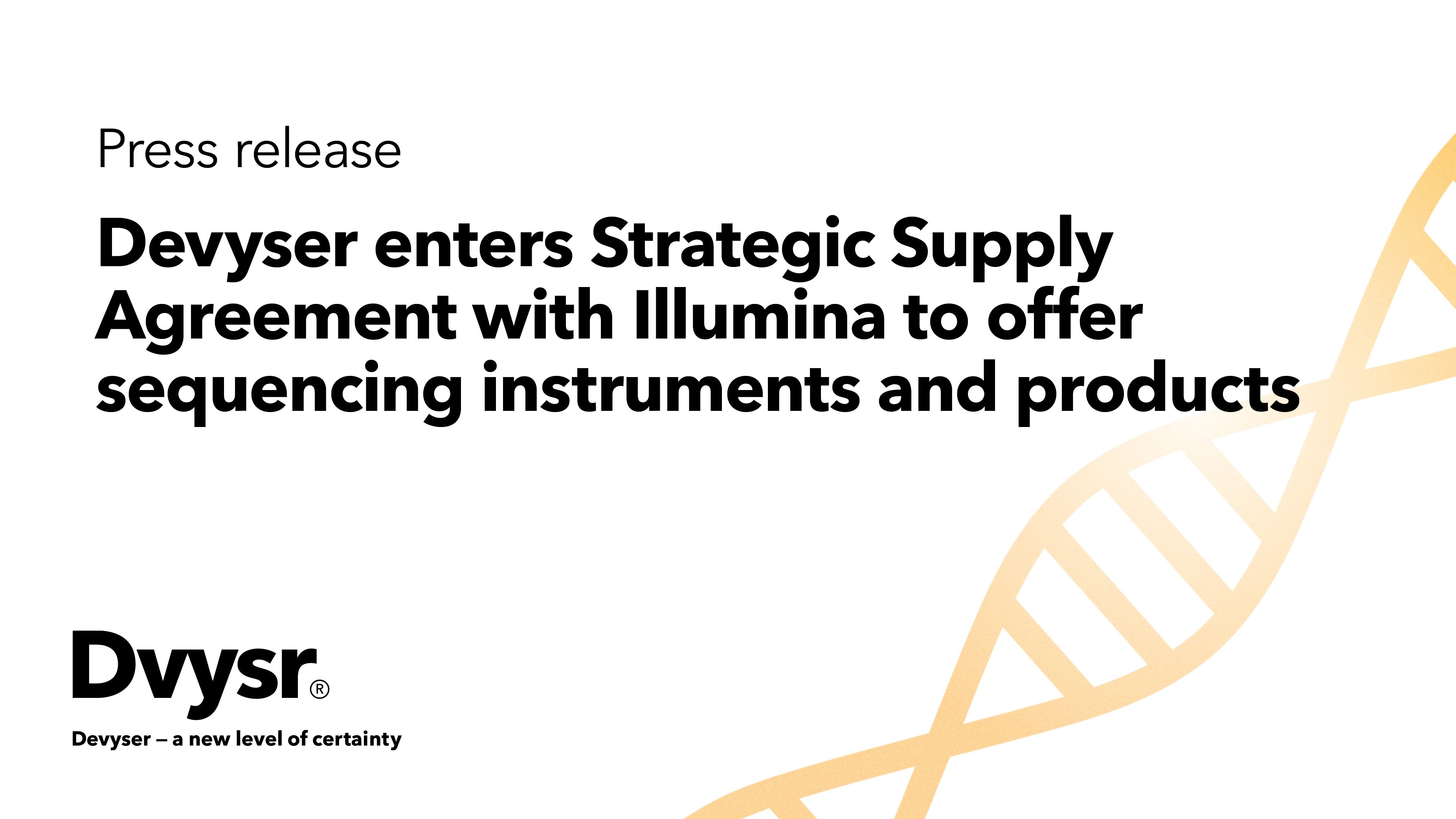
Devyser today announced that it entered a strategic agreement with Illumina, a global leader in DNA...
Read More
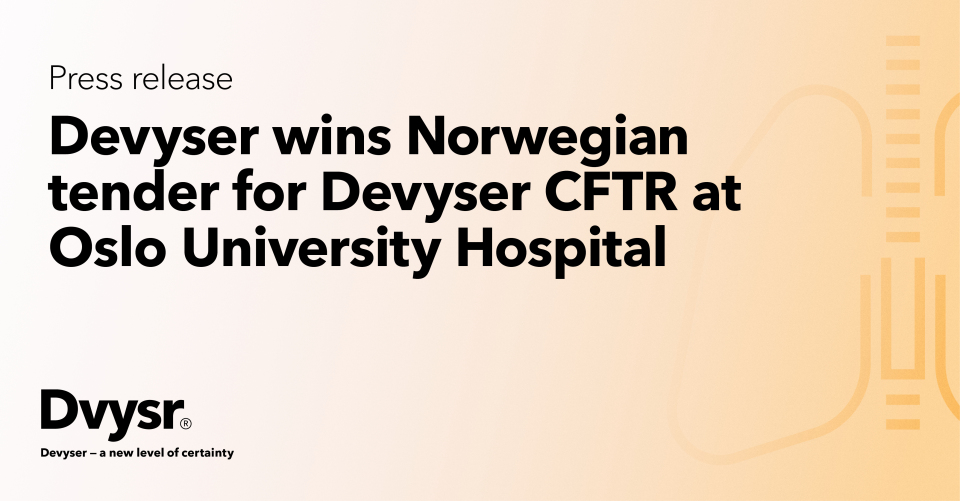
Devyser is proud to announce that the company has been awarded a tender by Oslo University Hospital...
Read More
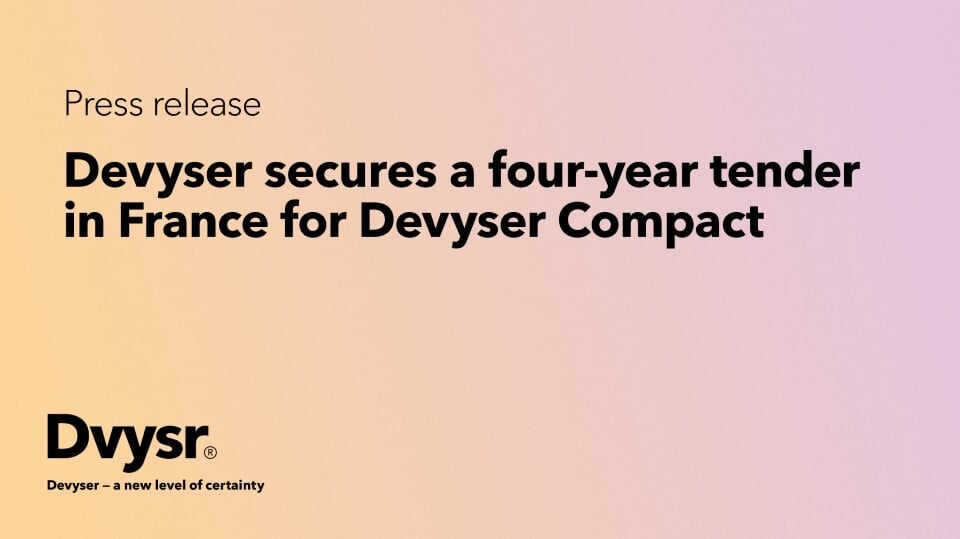
Devyser, a leading provider of advanced genetic testing solutions, has been awarded a new tender in...
Read More
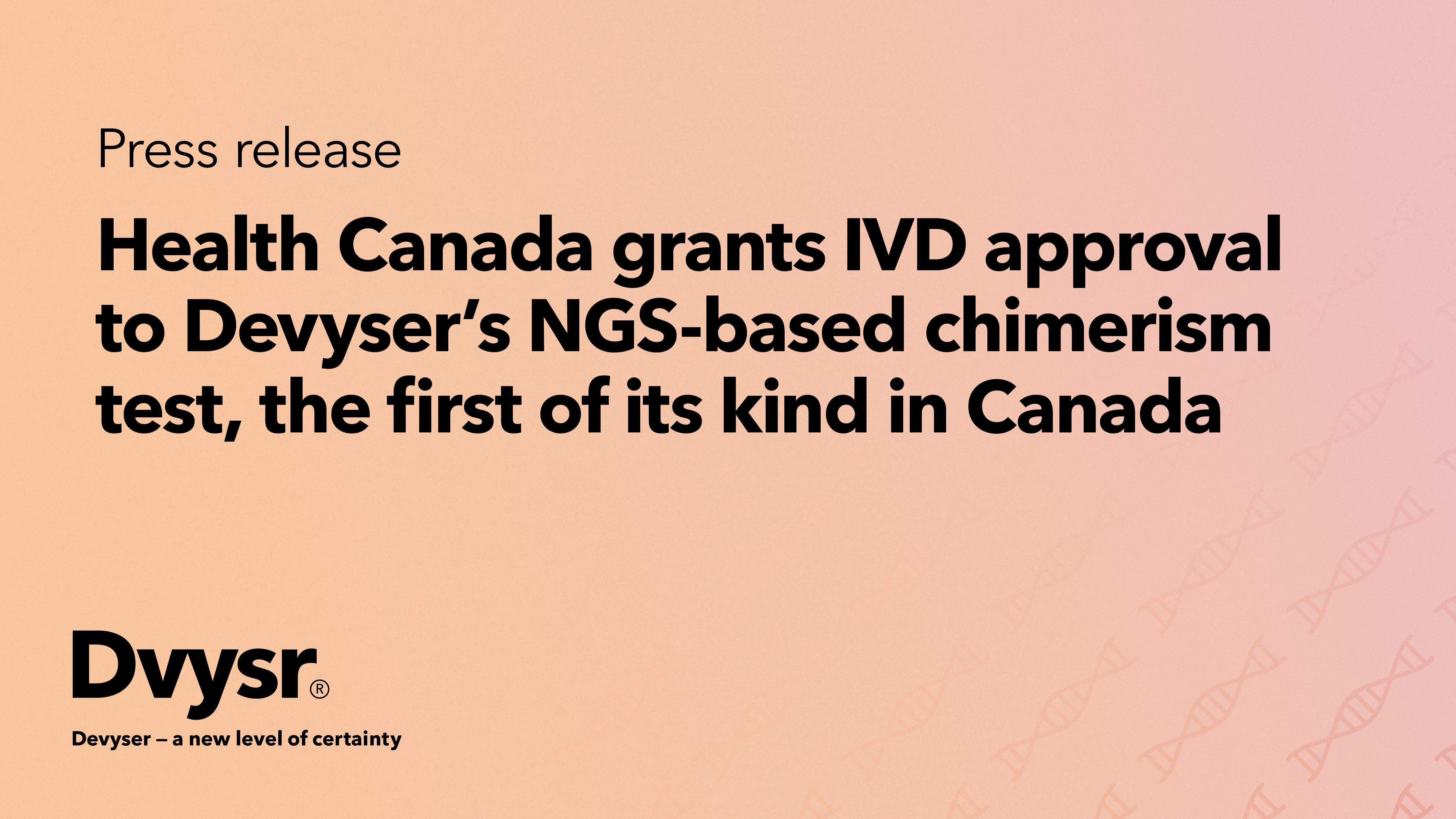
Devyser is proud to announce that One Lambda Devyser Chimerism and Advyser Chimerism have been...
Read More